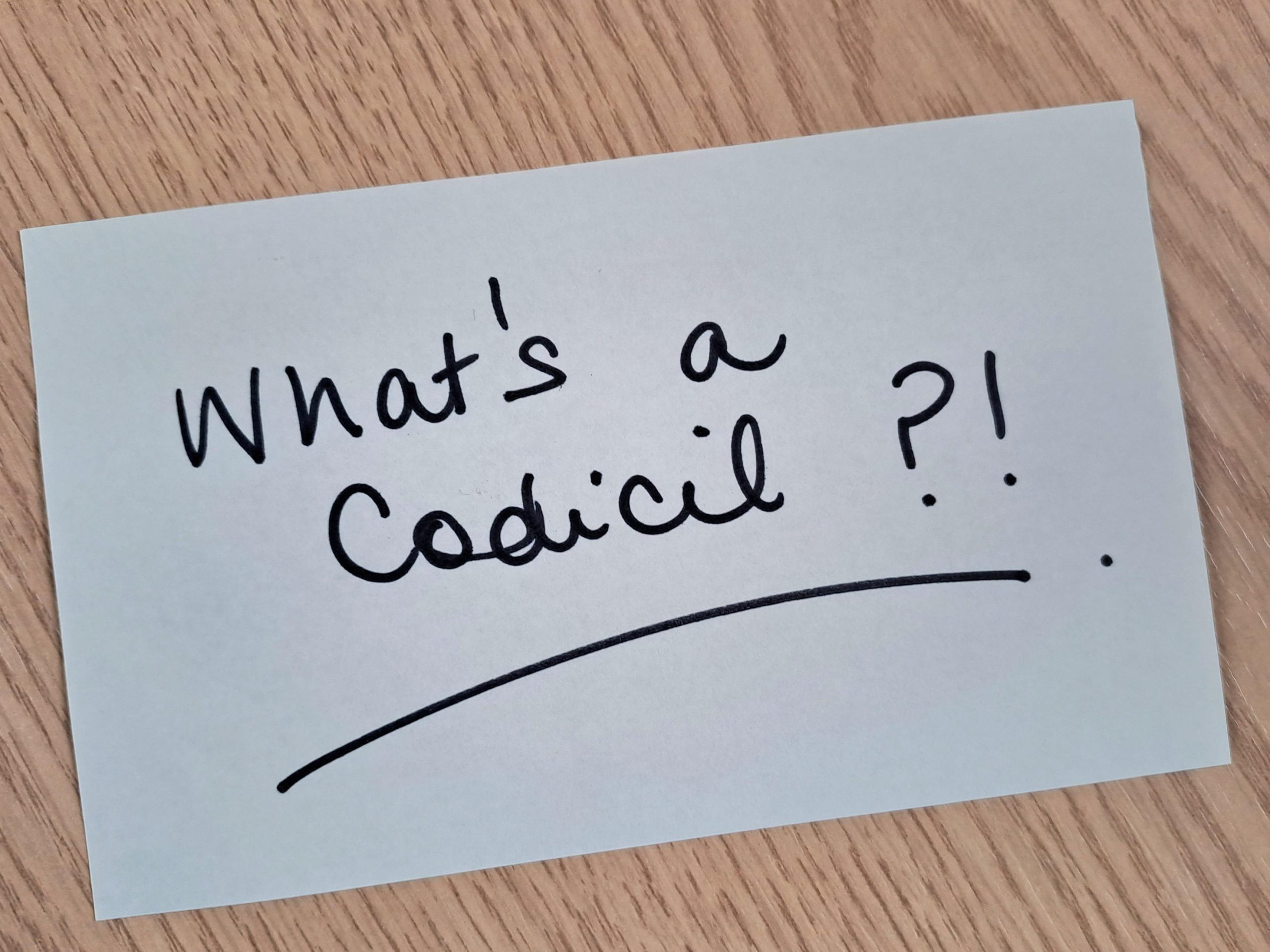An A to Z of Wills – beneficiary, codicil, dependent? We explain!

Wills… it’s a simple concept, so why are the words so complicated? We explain the terms and phrases involved, and make it easy for you!
Glossary:
Administration
The act of dealing with the affairs and the estate of a person who has died. This will include the payment of debts, collecting together assets, and ensuring that the terms of the will are adhered to.
Administrator
The person who handles the deceased’s affairs if there is no will.
Beneficiary
A person who is set to gain from a will.
Capacity
Capacity or more precisely, mental capacity refers to an individual’s ability to make a will.
Chattels
Assets of a person that can be moved from place to place, i.e. not property or land, for e.g. jewellery, paintings, furniture, cars, etc.
Codicil
An amendment to a will.
Contested
A formal objection or challenge raised against the validity of a will.
Court
A place where legal matters are heard and decided upon, usually by a judge or someone with judicial authority.
Dependent
An individual who is supported by another individual. For example, a child is the dependent of their parent.
Deed of Variation
Allows the beneficiary to alter the terms of a will after a person’s death, albeit conditions apply.
Direct Descendants (or issue)
Also known as a lineal or ‘offspring’ descendant, direct descendants refer to those who are related through parent-child relationships such as grandchildren, great-grandchildren etc. This term does not extend to any other family members.
Discretionary Trust Will
This form of will involves leaving assets in a trust for the beneficiaries. The trust is then managed by selected ‘trustees’. Under this type of trust no beneficiary has a right to benefit from the trust just a mere hope that they can do so.
Estate
The property and assets of the person who has died.
Executor
The personal representative appointed by the will.
Grant of Letters of Administration
Authorises the administrator to manage and distribute the estate if there is no will.
Grant of Probate
A document that confirms the legal authority of an executor to administer the estate of the deceased.
Guardian
An individual appointed to take care of a child and make decisions on their behalf.
Inheritance Tax
Tax payable on the value of a person’s estate when they die.
Intestate
A person dying without making a will.
Lasting Power of Attorney
A document that relates to your property and affairs or your personal welfare i.e. decisions about medical treatment.
Legacy
A legacy is a specific gift left within the will to an organisation or individuals.
Letter of Wishes
A document that accompanies a Will Trust which details how the Testator wishes for the trust to be administered.
Letters of Administration
A document issued by the Court that gives the administrators the legal right to deal with someone’s property, money and possessions, their estate when they die.
Life Interest
A gift of property or money to a person for their lifetime.
Minor Beneficiaries
Beneficiaries who are under the age of 18 years old.
Mirror Wills
When a husband, wife or partner make almost identical wills to each other. Each person however has the ability to change their will at any point.
Mutual Wills
Wills made by two people typically in the same terms with the agreement that neither party will alter or revoke either will during their lifetimes or without the other’s consent, or after first death.
Next of Kin
Not a legal definition, but is usually understood to be a person’s closest relative, in the following order:
- A husband, wife or civil partner. Unmarried partners are also considered
- An adult child including adopted children but step-children might not be included.
- A parent
- A sibling
Nil-rate Band
The value of an estate before inheritance tax becomes payable.
Personal Representative
The person responsible for managing the deceased’s estate.
Probate Registry
The office that deals with applications for grants of probate after someone passes away.
Residuary Gift
a provision that leaves the remainder of an estate to a named beneficiary/s after all other gifts and debts have been settled.
Residue
The remainder of the deceased person’s estate after their debts have been paid and specific gifts given.
Testamentary Expenses
Expenses incurred during the administration of an estate.
Testator
The person who creates the will.
Trust
An arrangement where by one or more persons hold property for the benefit of others (the beneficiaries).
Trustee
The person who holds trust property for the benefit of someone else.
Valuation
Valuation of the estate at the time of death.
Will
A legal document that expresses a person’s instructions as to how their property is to be distributed after their death.
Witness
A person that confirms that the will-writer is the same person who is signing it.
More on wills:
Are wills worth the paper they’re written on?
Sorry to mention this… but but when you die, is your business prepared?
For further information, please contact Melissa Butler on 01756 692878 or email melissa.butler@awbclaw.co.uk
4 May 2023

